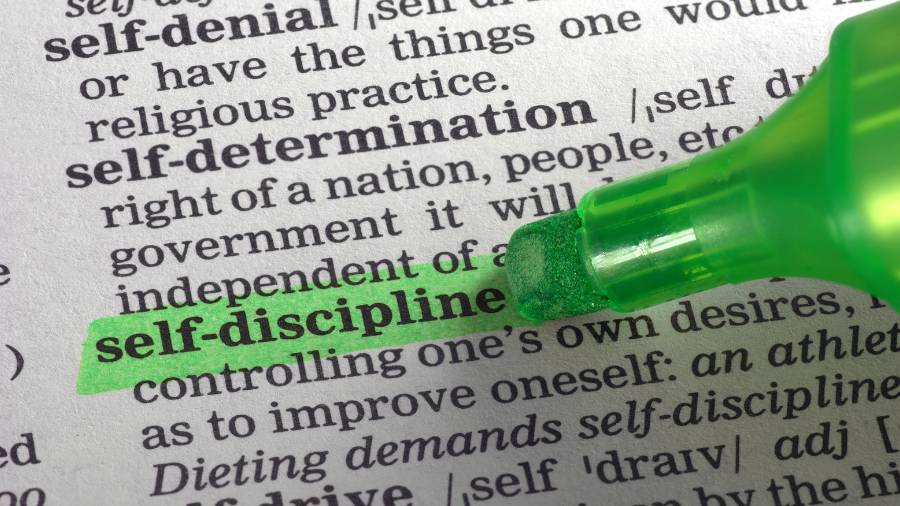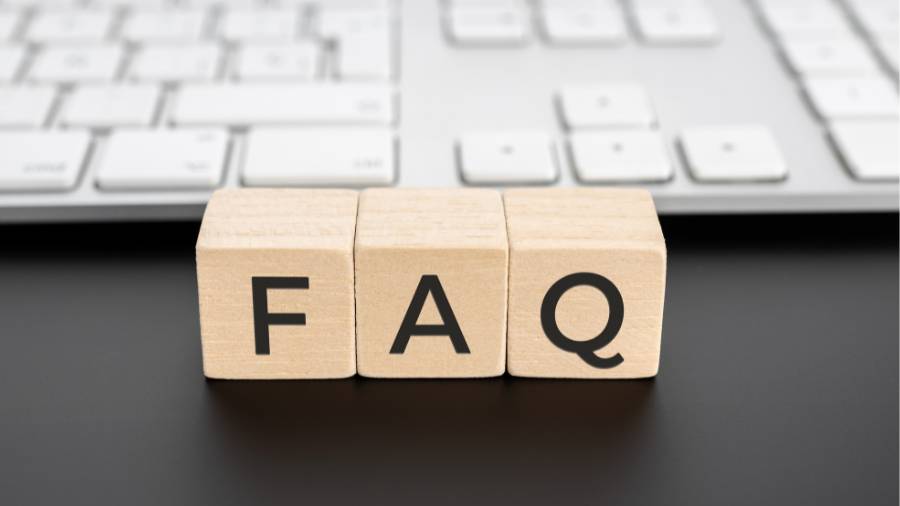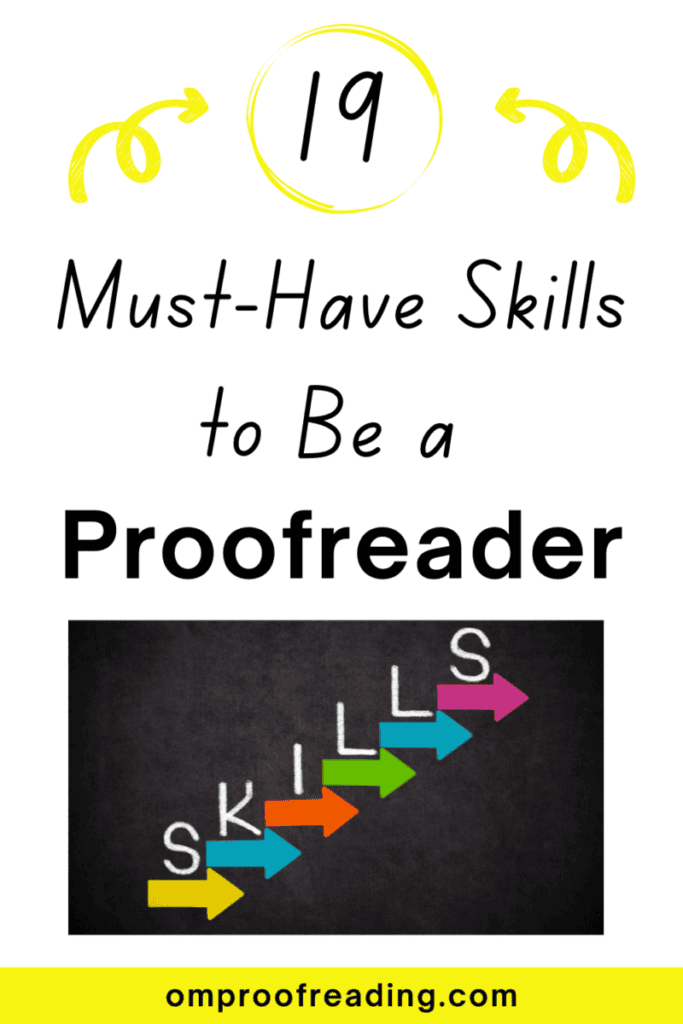This article may contain affiliate links. Please see our affiliate disclaimer in the footer menu for more information. Thank you for your support!

You need a specific set of skills to be a proofreader. If you were your friends’ go-to proofreader in high school or college, that’s probably an indication that you have the potential to do well in this profession. However, it doesn’t mean you can start right away.
Becoming a professional proofreader requires hard work and more than just a strong command of English grammar and mechanics.
Essential Proofreading Skills to Be a Proofreader
Let’s discover the specific skills that every proofreader needs in their repertoire.
1) A Great Grasp of Grammar
Grammar is the study of words, how they function relative to context, and how they come together to make sentences. Words can be broken down into categories called parts of speech, depending on their role in a sentence.
The English language contains eight parts of speech: nouns, pronouns, verbs, adjectives, adverbs, prepositions, conjunctions, and interjections.
Some words can serve as multiple parts of speech, depending on their role in a sentence.
Proofreaders need to correctly identify the parts of speech so they can fix mistakes within a document.
For example, the proper capitalization of titles depends on correctly identifying parts of speech.
If you’d like to boost your grammar game, check out my article “15 Tried-and-True Tips to Improve Your Grammar.”
2) The Capability to Correct Capitalization Errors
When considering capitalization, proofreaders often have to differentiate between common nouns and proper nouns.
Furthermore, they watch out for writers who mistakenly capitalize certain words because they think those words are particularly important.
Authors tend to do this with words related to religion (if they’re religious) or terms associated with their profession.
Capitalization rules can be surprisingly specific.
3) A Penchant to Proofread for Proper Punctuation

Who knew that such little marks could cause such big blunders?
Many people have seen the meme with the first sentence that reads, “Let’s eat Grandma.” Then, some compassionate soul decided to put a comma after the word eat, so the second sentence says, “Let’s eat, Grandma.”
It concludes with this nugget of wisdom: “Punctuation saves lives!”
Proofreaders need to be familiar with the proper use of punctuation marks. Commas, hyphens, and apostrophes tend to be the most complicated marks to master.
To gain more confidence with commas, you can check out Grammar Lion’s free comma mini course.
4) Superb Spelling Smarts
Spelling errors need to be plucked out of a document like weeds out of a garden.
It’s a proofreader’s job to find misspelled words that have made their way past spellcheckers. The common culprits are homophones (e.g., their vs. they’re vs. there).
I published an article called “20+ Difficult Homophones (+ Example Sentences and a Quiz)” if you’d like some practice in this area.
Spellcheckers fail to flag these words that are spelled correctly but used inappropriately in a given context.
Speaking of spelling, let’s go off on a mini tangent. When I was young, my dad taught me how to spell the word coffee phonetically without using any of the letters in the word coffee. He got out a sheet of paper and wrote kauphy. I thought that was neat! 😊
And, yes, I do love my kauphy! 😉
5) Finesse with Fixing Formatting Fumbles
Proofreaders need to hone their eagle eyes to pick up on formatting faux pas like incorrect font type or size.
They also have to be on the lookout for inconsistent spacing between elements in a document (e.g., headers, paragraphs, sentences).
Furthermore, they’ll want to ensure that features like headings, subheadings, and paragraphs are appropriately aligned and that any numbers appear in the correct sequence.
How certain documents are formatted depends on the style guide the proofreader uses.
6) Stellar Style Guide Familiarity
Your style guide will be your number one on-the-job companion. In your early proofreading jobs, you’ll refer to it constantly.
If you proofread in US English, your go-to guide will probably be The Chicago Manual of Style.
Other widely used style guides include The Associated Press Stylebook, the MLA (Modern Language Association) Handbook, and the Publication Manual of the American Psychological Association.
I created an article that explains these style guides and how to use them if you’re interested.
Finally, if you fancy proofreading UK English, you’ll probably follow New Hart’s Rules: The Oxford Style Guide.
7) Refined Research Ability
Proofreading requires a lot of research, some of which will take place in a dictionary. The dictionary you use will be dictated by the style guide you’re following.
You’ll often look up words not to check their meaning but to verify how they’re spelled, if they’re one word or two, if they need to be hyphenated, and what part of speech they are.
In terms of writing a word as one word or two, pick up is a verb, but pickup can serve as a noun or an adjective.
Also, I would need to use a couple of hyphens in this sentence: I use coffee as a morning pick-me-up. Very true, by the way.
Finally, an example of when the part of speech matters is deciding whether to capitalize a word in a title.
You’ll also do a lot of research using Google.
I use Google to check the spelling of industry-specific terms that have yet to be included in my spellchecker’s dictionary. I also refer to Google if I need to know something about an unfamiliar subject.
Finally, you’ll spend a substantial amount of time doing research in the style guide you’re using.
8) Competence with Computers

In addition to knowing how to get what you need from Google, you’ll need to understand how to use specific software.
As a freelance proofreader, it’s necessary to be familiar with Track Changes in Microsoft Word.
Track Changes is a function in Word that allows you to make easy-to-see corrections and comments in a document. Your client can then review each revision to decide whether to keep or reject it. They’ll also read the comments you’ve made in the margins.
Although most freelance proofreaders prefer to work with Track Changes in Word (and most clients send Word documents), a few clients would rather work in Google Docs.
Google Docs has a feature that’s a lot like MS Word Track Changes: the Suggesting feature. You’ll undoubtedly be able to land more jobs if you’re familiar with the Suggesting feature in Google Docs.
Some freelancers even learn to work with PDFs.
Now and then, I (as a freelancer) come across a client with a PDF. However, PDF markup software will likely be the norm if you work for a publishing company.
If you’d like to learn more about Track Changes in MS Word, the Suggesting feature in Google Docs, and PDF markup tools in Adobe PDF editor, please see my post “What Software Do Proofreaders Use?”
9) Capacity to Concentrate for a Long Time
Proofreading requires a high degree of focus.
Although you’ll be taking frequent breaks, you’ll need to maintain concentration for several hours if proofreading is your full-time job.
If you’re constantly distracted, getting through projects will take a long time. So, you’re going to have to be able to hocus-pocus focus! 😊
10) Keen Attention to Detail
Perfectionistic and punctilious are two of the best adjectives to describe proofreaders. They tend to have a natural knack for spotting errors since they look closely at the little things.
Proofreaders go through texts with a fine-tooth comb to find errors, much like Sherlock Holmes carefully combed through crime cases for clues.
You’ll be the detective on a mission to spot the teeny-weeny mistakes.
Brevity is key in résumés and PowerPoint presentations. Therefore, these texts contain fewer words, and any mistakes tend to stand out.
When every little detail counts, you’ll be the one who makes sure these pieces of writing are on point.
11) Ability to Work Alone
Even if you work at a company, proofreading is done solo.
If you plan on becoming a freelancer and feel a bit iffy about this, you can work at a coffee shop or bookstore so that you’ll be surrounded by people.
I love going to my local Barnes & Noble café to sip on some delicious coffee while I’m on error patrol. That way, I don’t get too lonely.
12) High Level of Self-Discipline

If you work as a freelancer, no one will be around to keep you on track and motivated except yourself.
Of course, you’ll be accountable to your clients, but they won’t be there looking over your shoulder to ensure you get the work done.
Having a high level of self-control is essential. It’ll enable you to keep your focus on your client’s document instead of on your friends’ latest Facebook posts (or any other time suck).
13) Inclination to Be an Independent Thinker
You’ll make all the decisions in your proofreading work.
You have to decide to take that comma out or leave it in. If this sounds intimidating, don’t worry—it gets better!
You’ll build more confidence in your proofreading abilities as you hone your skills.
You just have to be willing to research what you don’t know and come to your own conclusion when making the final call on that comma.
14) A Knack for Staying Organized While Juggling Multiple Jobs
Proofreaders typically take on more than one assignment at a time. This means they’ll have different deadlines to meet.
They need to know exactly how much work they have to get done each day to complete their jobs on time.
They must plan well in advance if they take on long projects (books, e-books, etc.).
It’s essential not to take on more work than you can manage. Sacrificing quality for quantity is a surefire way to lose clients and tarnish your reputation.
Meeting tight deadlines is one of the most challenging aspects of being a proofreader.
Om Proofreading discusses the benefits and drawbacks of proofreading work if you’d like to delve into this topic.
15) A Love of Reading
This one is fairly obvious. As we all know, proofreading involves a lot of reading.
If you don’t enjoy reading, it will be a ginormous challenge to enjoy proofreading.
I’ll be honest. I don’t like reading fiction. Gasp! I know. I wish I did, but I don’t. I feel like I’m one of the few people who couldn’t make it past the first chapter of the first book in the Harry Potter series.
My mom and sister devour fiction, but my dad and I keep it at a distance. I also don’t proofread fiction. It’s just not my thing, and that’s okay. I am, however, a voracious reader of nonfiction.
Just make sure you love to read in general, and you should be good to go!
16) Broad General Knowledge

When you start proofreading, you’ll probably be working on a variety of texts. This is because you’ll need to take the jobs you can get to gain experience. Therefore, it’s helpful to have a wide range of knowledge.
After you’ve gotten some experience, it’s beneficial to market your proofreading services to a niche where you’ll have less competition.
You can do this while working on a wide array of texts until you’re sure you can maintain a steady stream of clients who provide you with jobs in your niche.
For example, if you fancy financial texts, marketing materials, and management matters, your niche could be proofreading business documents.
I wrote an article about choosing a proofreading niche if you’re interested.
17) Commitment to Being a Lifelong Learner
Language is continually evolving.
According to The Chicago Manual of Style, “With frequent use, open or hyphenated compounds tend to become closed (on line to on-line to online).”
Style guides themselves are occasionally updated as well.
Dictionaries are also regularly adding new words. For example, hashtag and fist pump were a couple of additions to the eleventh edition of Merriam-Webster’s Collegiate Dictionary.
Finally, new industry-specific terms pop up from time to time.
Proofreaders need to be up to date with these kinds of changes.
18) Solid Written Communication (Especially Freelance Proofreaders)
Proofreaders need to be able to communicate clearly and effectively in writing.
If you’re working in a publishing house, your written communication will probably be in the form of emails with other publishing team members.
However, if you’re doing freelance work, you’ll communicate directly with your clients in writing via email or some other platform.
Considering you’ll be responsible for correcting errors in their written work, they’ll expect you to have excellent written communication skills.
19) Some Money Management and Marketing Skills (Freelance Proofreaders Only)
As a freelancer, you’ll need to keep track of your business’s income and expenses and prepare your taxes.
Knowing how to market yourself (whether through social media platforms, cold emailing, or distributing business cards) is also a necessary skill.
You’ll have to be proactive to develop a client base.
The Freelancer’s Bible is a fabulous resource for freelancers of all kinds. It was written by Sara Horowitz, who founded Freelancers Union.
This book provides a wealth of helpful knowledge for starting, managing, and growing your business. In a nutshell, it’s your guide to success as a freelancer.
I hope this post has helped you gain insight into the skills you need to become a proofreader.
If your goal is to work on error patrol 😉, I published a piece about becoming a proofreader, even if you don’t have any experience.
Frequently Asked Questions

Do I need a degree to be a proofreader?
You do not need a degree to be a proofreader. Nowadays, many jobs in the proofreading industry are freelance and don’t require a degree.
As long as you have a firm grasp of grammar and mechanics coupled with excellent proofreading skills, you can be a proofreader.
Postsecondary education undoubtedly helps improve your reading and writing abilities. However, plenty of high school graduates are avid readers and wonderful writers.
Although many companies prefer to hire someone with a degree (especially in English or journalism), this is not always a requirement. Of course, some companies won’t even consider you for a job unless you hold a master’s degree or a PhD.
If you’d like to learn where to find jobs as a new proofreader without a degree, Om Proofreading talks about online proofreading jobs for beginners in this in-depth article.
In sum, if you (degree or no degree) have a strong command of English and are willing to put time and effort into learning the art of proofreading, you’ll be well on your way to becoming a proofreader extraordinaire!
I authored an article about the qualifications proofreaders need if you’re curious about what you do and don’t need to know for various proofreading jobs.
How do I get a job if I don’t have proof of my proficiency as a proofreader?
You need experience to get the job, but you need a job to get the experience. Doesn’t this sound familiar? It’s the ol’ catch-22. Frustrating. I know. But there are ways around it!
You can start by displaying any certificate of completion you’ve earned in a proofreading course to show you’ve received formal training.
This can be posted on your business website or in the profile you’ve set up on a freelancing website. Om Proofreading has an article about how to obtain a proofreading certificate if you’d like to know more.
Another way to prove your skills to a potential client is by offering to proofread a small portion of their document.
In the industry, this is known as a sample edit. I’ve seen proofreaders provide sample edits ranging from 250 to 1,000 words. Some do this for free, while others charge a fee. Either way, this lets potential clients see how you’d be able to help them.
You can also demonstrate your proficiency by passing the proofreading test required by some companies as an entry requirement.
These businesses make applicants take a test so they can quickly weed out those who don’t yet have the skills for the job.
Finally, another option is to have lots of positive reviews on a freelancing site like Fiverr, Upwork, or Freelancer.
You’ll likely have to start by charging a low price to attract clients, but at least this will get the ball rolling. If you deliver excellent service at an affordable price, it’s a safe bet that you’ll start accumulating glowing reviews. Eventually, you can increase your fees as you see fit.
How do I become a good proofreader?
To become a good proofreader, you need to take a comprehensive course and practice what you’ve learned.
In addition to the practice you get in a course, you can practice by taking proofreading tests, reading relevant books and blogs, and listening to podcasts that deal with proofreading matters (grammar, punctuation, etc.).
If you’d like pointers for improving your proofreading proficiency, please peruse my post “15 Guaranteed Ways to Become a Better Proofreader.”
Best wishes to you!
“I never lose. I either win or learn.”
– Nelson Mandela

Recent Posts
Punctuation is important because it enables us to communicate our message clearly and effectively. Without punctuation, we wouldn’t understand how units of a sentence relate to one another or how...
Although you're probably somewhat familiar with adverbs, you may be unaware of sentence adverbs. As a trained proofreader who has studied the parts of speech, I can help you understand this unique...
